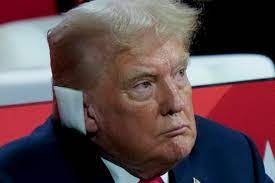Donald Trump has experienced a surprisingly successful summer, increasing the likelihood of winning a second term as president. As a result, financial markets are once again embracing the “Trump trade,” which will have various implications for stocks, bonds, cryptocurrencies, interest rates, and inflation.
The upturn for Trump began with the presidential debate on June 27, during which President Joe Biden’s stumbling performance raised concerns about his age and stamina. Since then, a growing number of Democrats have been calling for Biden to step aside and allow Vice President Kamala Harris or another younger Democrat to take on Trump.
In addition to these political developments, Trump also survived an assassination attempt on July 13 and selected J.D. Vance as his vice presidential running mate, making him the first millennial to be appointed to a national ticket. Furthermore, former Trump challengers put aside their differences and rallied behind the former president at the Republican convention, demonstrating a rare display of unity within the party.
It appears that Trump is moving towards a more moderate stance, possibly in an effort to appeal to swing voters and mainstream business supporters. In an interview with Bloomberg Businessweek, he reassured Wall Street that there would be no chaos in a second term. He expressed his intention to keep Jerome Powell as the Fed Chair until the end of his term in 2026, as long as Powell is making the right decisions. This implies that he would lower interest rates, but only while he is in office and not during the fall, when it could benefit Biden.
Trump tried to alleviate concerns about inflation caused by new tariffs, although he didn’t explain how he would achieve that. He even mentioned that he would consider JPMorgan Chase CEO Jamie Dimon for the position of Treasury Secretary, which would involve having a prominent figure from Wall Street in the role, if Dimon were to accept.
Investor concerns have shifted away from earnings and inflation due to the influence of upcoming elections. Economist David Rosenberg of Rosenberg Research noted that there is a growing belief that Donald Trump will emerge as the victor, leading to a surge in “animal spirits” among investors. Betting markets, although not always reliable, currently give Trump a 66% chance of winning, indicating increasing likelihood of a Republican sweep where the GOP gains control of both houses of Congress.
If Democrats were to gain control of at least one chamber of Congress, they would likely oppose further corporate tax cuts, which could hinder the GOP’s plans. This potential scenario has led to a shift in investor sentiment, with a rotation out of tech stocks and into smaller companies that are considered value stocks. The idea behind this move is that more tax cuts would benefit smaller shares and help them catch up in value to larger, more established companies.
Surprisingly, cryptocurrencies have also benefited from Trump’s increasing popularity. Despite being skeptical in the past, Trump now promises to halt government regulations on cryptocurrencies in order to appeal to younger voters who are enthusiastic about this trend. Following an attempted assassination on July 13, the value of bitcoin surged by $1,000 within the first hour as buyers speculated that the incident would improve Trump’s chances of re-election. Over the next four days, bitcoin continued to rise by an additional $4,500, with most other cryptocurrencies following suit.
However, the prospects for a second Trump presidency are not entirely optimistic.
For example, President Trump’s proposals to increase import tariffs and remove undocumented immigrants from the country would have inflationary effects. This is because these policies would raise the prices of imported goods and potentially increase labor costs by creating labor shortages in certain industries.
This could potentially reverse the significant progress made in the past two years, where inflation has declined from its peak in 2022. As a result, there was hope that the Federal Reserve could begin to lower interest rates as early as September. However, any indication of resurgent inflation, including the implementation of Trump’s policies, could disrupt this progress and keep interest rates high. Some analysts believe that interest rates are already higher than they would be otherwise due to investors factoring in the potential inflationary impact of Trump’s policies.
If you have any questions or would like to reach out to Rick Newman, you can drop him a note, follow him on X, or sign up for his newsletter.
Investors are currently searching for specific sectors or companies that may be impacted by a potential second term for President Trump. In a recent interview with Bloomberg, Trump suggested that he would not provide aid to Taiwan in the event of a Chinese attack, despite Taiwan being a crucial source of advanced semiconductors that are essential to both the US economy and the artificial intelligence industry. Additionally, Trump proposed that Taiwan should pay for the United States’ protection.
These remarks caused a sell-off in tech stocks, leading to a 2.5% decline in the Nasdaq stock index on July 17. Capital Economics commented on this, stating that the pressure on big tech stocks was likely due to Trump’s statements regarding Taiwan’s defense payments. As a result, shares of TSMC, Taiwan’s semiconductor giant, dropped by 7%.
Although Trump is currently experiencing success, his re-election is not guaranteed.
Despite facing several challenges, Biden is trailing Trump by less than three points in the polling average reported by the Cook Political Report. The upcoming election remains unpredictable, with the potential for even more surprises. There is still the possibility of Biden withdrawing from the race, leading to the emergence of a different Democratic candidate. Additionally, Trump is scheduled to be sentenced on 34 felony convictions in the New York City fraud trial on September 18, a mere six weeks before the election. Furthermore, the advanced age and potential frailty of both candidates increase the chances of a health emergency occurring during the final stretch of the election.
